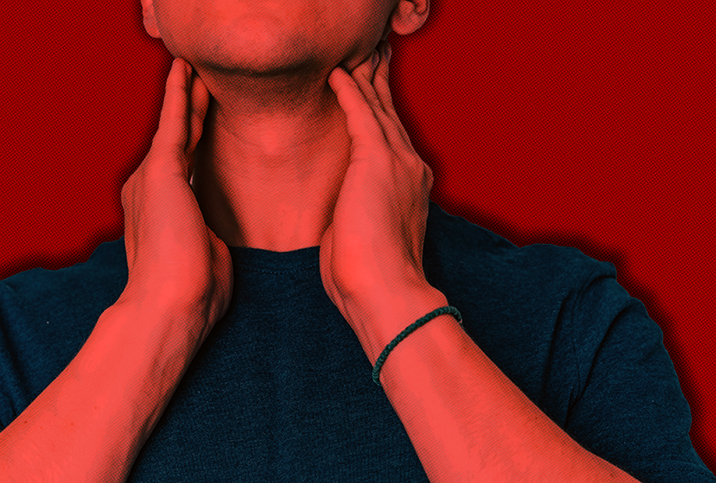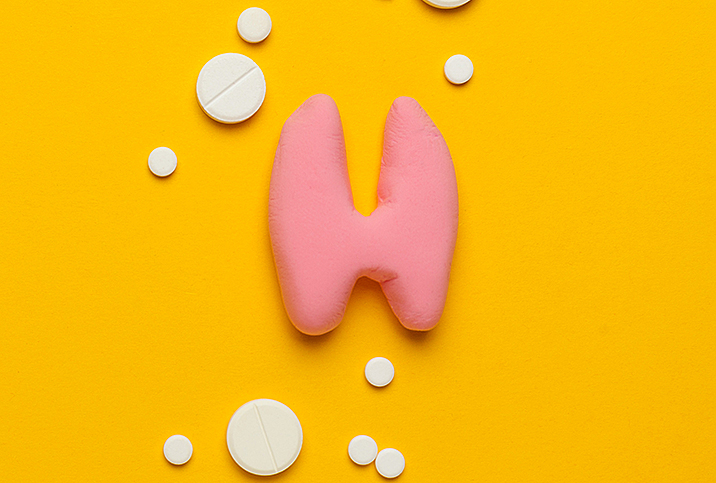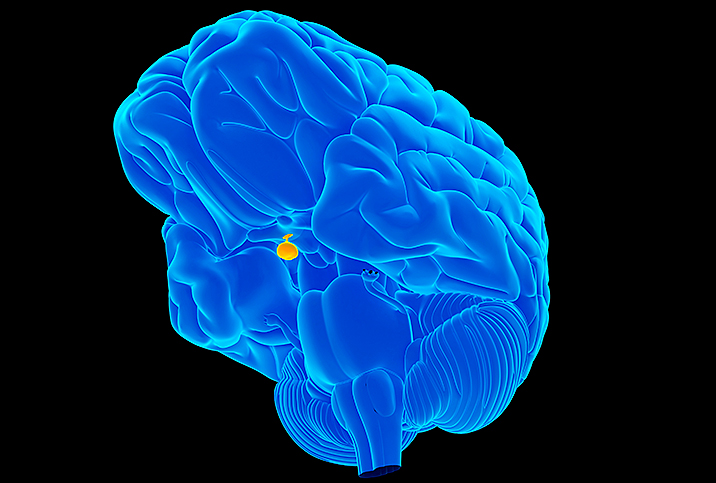Don't Let This Temperamental Gland Diminish Your Erectile Function

A small gland in your neck could have a big impact on your ability to achieve an erection.
Issues with the thyroid—the butterfly-shaped gland below the Adam's apple at the base of the neck that produces hormones critical for metabolism—may lead to erectile dysfunction (ED) in men. Both hypothyroidism (underactive thyroid) and hyperthyroidism (overactive thyroid) have been linked to ED and other types of sexual dysfunction, though the exact mechanism behind the association is unknown.
A report published in the Journal of Clinical Endocrinology & Metabolism indicated that 79 percent of the 71 men in the study with thyroid problems experienced some degree of ED. The study reported that ED was more common in men with hypothyroidism than hyperthyroidism; only one-third of the men in the control group showed ED issues.
Fortunately for guys with either issue, treating thyroid disease may restore erectile function.
"Thyroid issues and sexual dysfunction in males can definitely be interrelated," said Darshan Patel, M.D., an assistant professor of urology at University of California San Diego Health. "For the most part, we see that guys that have low thyroid function typically have lower testosterone levels. If you treat the underlying hypothyroidism, that can also help with symptoms of sexual dysfunction or libido."
What do we know about the link?
Several mechanisms are possibly related to the development of ED in patients with thyroid disease, said Wael Almajed, M.D., a clinical fellow in the Urology Department at Tulane University in New Orleans.
It's believed hypothyroidism reduces testosterone, and lower testosterone levels can lead to ED, Almajed said. Another function that occurs during hypothyroidism is an increase in the hormone prolactin. This increase can reduce a person's libido, which can contribute to the development of ED.
"In the case of hypothyroidism, patients a lot of times have depression, so mental well-being is also part of it and that also can subsequently cause troubles with attaining an erection," he said.
'We think there is a high percentage of people that have sexual side effects because of their thyroid diseases.'
Hyperthyroidism, on the other hand, can lead to irritability, high heart rate and heat intolerance, which can affect the erectile tissue.
"So it interferes with the natural erection mechanisms—a more direct effect as compared to the hypothyroidism," Almajed said.
In addition to ED, both hypo- and hyperthyroidism have been linked to ejaculatory problems. Patients with hyperthyroidism tend to experience premature ejaculation, whereas those with hypothyroidism are prone to delayed ejaculation.
"We think there is a high percentage of people that have sexual side effects because of their thyroid diseases, approaching about 50 percent for both hyper- and hypothyroidism," Alamajed said, adding that the breakdown is about 20 percent to 50 percent for hyperthyroidism sufferers, and about 40 percent to 60 percent for people with hypothyroidism.
Addressing thyroid disease in patients with ED
Neel Parekh, M.D., a clinical assistant professor of urology at the Cleveland Clinic Foundation, commonly checks thyroid-stimulating hormone (TSH) as part of the bloodwork for men coming in with ED or low-T symptoms. A TSH test measures how well the thyroid is working and can determine whether a man has an overactive or underactive thyroid.
"Oftentimes, I'm the only person the patient is seeing because the guys are reluctant to see a medical provider unless they start having issues with their erections or sex drive," said Parekh, who pointed out that the symptoms of thyroid disease and low-T, such as fatigue and mood changes, can overlap.
Typically, hyper- and hypothyroidism can be managed by a primary care doctor. But if there's a concern about a thyroid tumor or something more severe, men may be referred to an endocrinologist or an endocrine surgeon.
"We have to do the appropriate workup because a lot of the overlap with testosterone and thyroid function is there," Patel said, adding that many of his younger patients with thyroid disease and ED don't even have a primary care doctor. "And if they truly do have thyroid issues or they have a red flag on that screen test, we try to get them plugged in with a primary care doctor who can appropriately address this."
More research is needed
Alamjed said the scientific evidence behind thyroid disease is not very strong because it hasn't been studied extensively. He thinks this is partly due to patients' reluctance to discuss their sexual performance and ED with their doctor. More larger scale studies are needed to observe sexual problems faced by men with hyper- and hypothyroidism.
"Most of the studies that we have are done on a few hundred people, so it might not be representative of the whole disease spectrum," he said, adding he would also like to see some studies that examine the frequency with which doctors screen patients with thyroid disease for ED.
'Most of the studies that we have are done on a few hundred people, so it might not be representative of the whole disease spectrum.'
"How many of them are actually specifically asking them about their erectile function?" he asked. "If the percentage is low, doctors will read these journals and will be more prompted to ask about these symptoms and subsequently treat them or refer them to a urologist who can treat it."
Patel would like to see more men with ED receive a comprehensive evaluation. Urologists need to focus on ED and take a "more global look at their overall health." For many men with ED, a number of components are involved, including low-T, thyroid disease, obesity and cardiovascular disease, which is why Patel thinks it's important to expand the focus to help men with all their different issues.
"I think that's going to be the next frontier in better evaluating guys who are presenting with ED and have other stuff going on," he said.


















